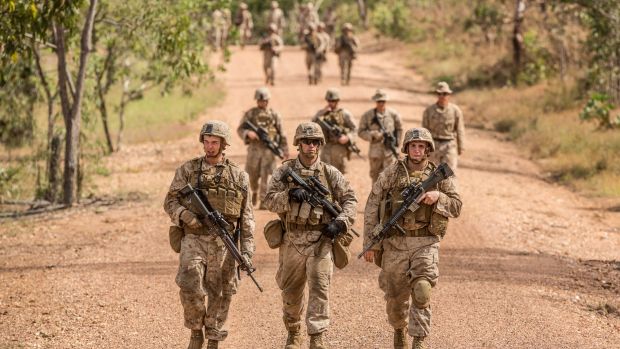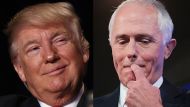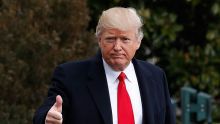Australia wants to be sure Donald Trump knows, when he bites, he'll get a bite back.
The US President deliberately embarrassed Malcolm Turnbull, as much as Trump now seeks to blame "fake news" for the furore after the leaked phone call.
More World News Videos
Twitter used against Trump
US Democrats have taken to Twitter to show support for Australia after the tense Turnbull-Trump phone call, with one Republican trying to smooth relations.
Minds in Canberra will now turn to find the means to send a not-too-subtle message that shaming an ally carries a cost.
The idea is not so crude as retaliation. Turning off the electricity at Pine Gap might be a tad overboard. So would having Julie Bishop boycott the next 4th of July party, or recalling ambassador Joe Hockey from Washington for consultations.
The aim is not to provoke another Trump tantrum; it's to ensure Americans think before treating the Australian leader as a drongo.
This is the international language of actions. Find something the Americans want, a form of support we are typically happy to provide, and take it away.
Do it quietly, without fanfare, but ensure it's done.
There is an Australian army general posted at the US military base in Hawaii who might want to pack a suitcase and get ready for a holiday at home.

More on that in a moment. First to the offence.
It matters not who was behind the original leak of details of last weekend's telephone call between the leaders to the Washington Post, or what they hoped to achieve.

Maybe it was US bureaucrats appalled at Trump's policies. Or maybe it was an effort to appease the President's hard-right supporters and make him appear tough.
But it was Trump himself who subsequently, and publicly, berated a "dumb deal" to swap refugees with Australia, threatening via tweet to study the arrangement further - a full five days after giving the PM a private assurance the deal would go ahead.

That left Turnbull blushing.
And that was before the President's spokesman mangled the PM's family name as "Trunbull" two days running, and before Trump started to blame the media. It also ignores this is a two-way deal, with Australia agreeing to settle Latin Americans that Trump wants to stop with his wall.

So what does that general in Hawaii have to do with how Australia should respond?
It's clear that working with America is going to involve working around Trump.

His Secretary of Defence James Mattis and National Security Adviser Michael Flynn are thought to be well disposed to Australia, and both know enough to recognise the needless offence Trump has caused.
They will also recognise the insult carries a cost. Australia needn't act immediately or in a fashion to spite ourselves.

Imposing an especially strict quarantine inspection of the next plane load of US marines landing in Darwin might be too obvious.
Instead, look to Hawaii, where Australian Major General Greg Bilton is the Deputy Commanding General for Operations at US Army Pacific, a position integrated in the US Pacific command.
The job gives Bilton tremendous experience with a massive force, the trust of commanding American troops, and in return, binds Australia tightly into US military planning.
Speaking in Sydney in December, the US commander for the Pacific, Admiral Harry Harris, boasted Bilton's "unique role demonstrates the deep relationship our nations share".
Deep relationships are founded on mutual respect. And with Trump picking fights with friends and foe alike, it might not be a bad thing for General Bilton to find he is suddenly needed at home.
No special explanation required to excuse his absence. But the message will be loud and clear.

















